Gender and Politics
VerifiedAdded on 2023/03/23
|10
|2600
|65
AI Summary
This essay explores the relationship between gender and politics, focusing on the challenges faced by women in leadership positions and the impact of democratization on gender equality in politics. It discusses the stereotypes and prejudices that women face in politics, the under-representation of women in government, and the benefits of democratization for women's leadership. The essay also highlights the success stories of women in politics and the barriers they still face. Overall, it emphasizes the importance of gender equality in politics and the need for equal opportunities for women.
Contribute Materials
Your contribution can guide someone’s learning journey. Share your
documents today.
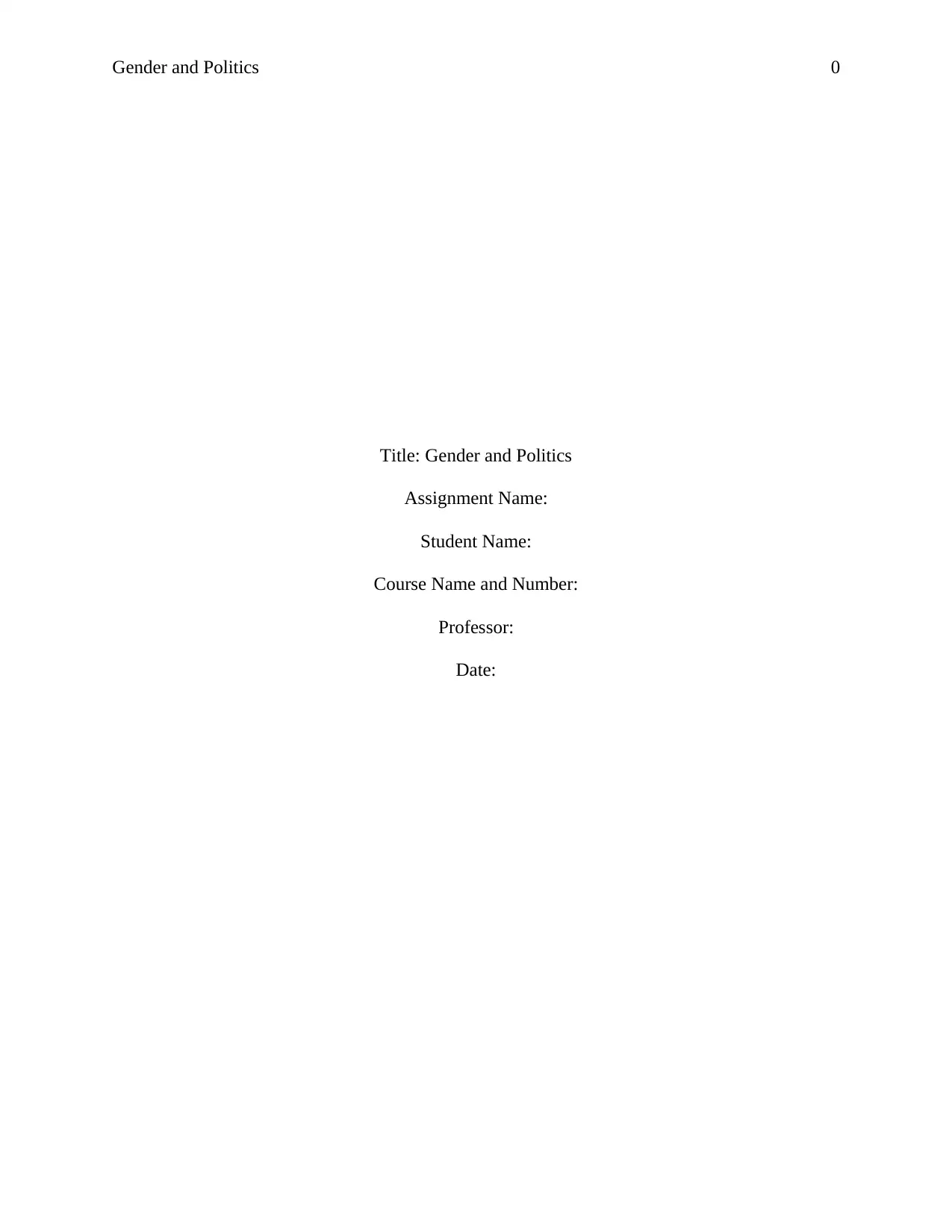
Gender and Politics 0
Title: Gender and Politics
Assignment Name:
Student Name:
Course Name and Number:
Professor:
Date:
Title: Gender and Politics
Assignment Name:
Student Name:
Course Name and Number:
Professor:
Date:
Secure Best Marks with AI Grader
Need help grading? Try our AI Grader for instant feedback on your assignments.
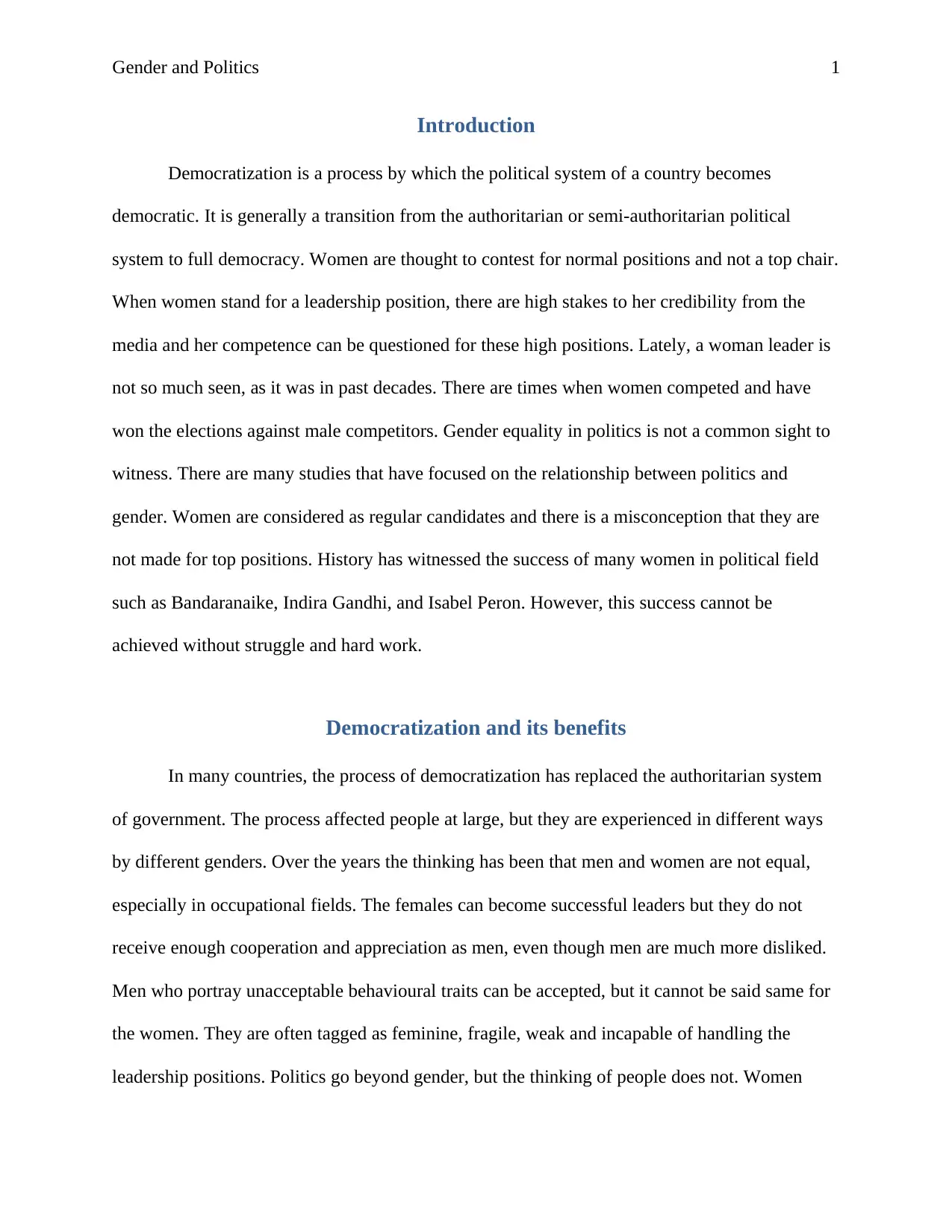
Gender and Politics 1
Introduction
Democratization is a process by which the political system of a country becomes
democratic. It is generally a transition from the authoritarian or semi-authoritarian political
system to full democracy. Women are thought to contest for normal positions and not a top chair.
When women stand for a leadership position, there are high stakes to her credibility from the
media and her competence can be questioned for these high positions. Lately, a woman leader is
not so much seen, as it was in past decades. There are times when women competed and have
won the elections against male competitors. Gender equality in politics is not a common sight to
witness. There are many studies that have focused on the relationship between politics and
gender. Women are considered as regular candidates and there is a misconception that they are
not made for top positions. History has witnessed the success of many women in political field
such as Bandaranaike, Indira Gandhi, and Isabel Peron. However, this success cannot be
achieved without struggle and hard work.
Democratization and its benefits
In many countries, the process of democratization has replaced the authoritarian system
of government. The process affected people at large, but they are experienced in different ways
by different genders. Over the years the thinking has been that men and women are not equal,
especially in occupational fields. The females can become successful leaders but they do not
receive enough cooperation and appreciation as men, even though men are much more disliked.
Men who portray unacceptable behavioural traits can be accepted, but it cannot be said same for
the women. They are often tagged as feminine, fragile, weak and incapable of handling the
leadership positions. Politics go beyond gender, but the thinking of people does not. Women
Introduction
Democratization is a process by which the political system of a country becomes
democratic. It is generally a transition from the authoritarian or semi-authoritarian political
system to full democracy. Women are thought to contest for normal positions and not a top chair.
When women stand for a leadership position, there are high stakes to her credibility from the
media and her competence can be questioned for these high positions. Lately, a woman leader is
not so much seen, as it was in past decades. There are times when women competed and have
won the elections against male competitors. Gender equality in politics is not a common sight to
witness. There are many studies that have focused on the relationship between politics and
gender. Women are considered as regular candidates and there is a misconception that they are
not made for top positions. History has witnessed the success of many women in political field
such as Bandaranaike, Indira Gandhi, and Isabel Peron. However, this success cannot be
achieved without struggle and hard work.
Democratization and its benefits
In many countries, the process of democratization has replaced the authoritarian system
of government. The process affected people at large, but they are experienced in different ways
by different genders. Over the years the thinking has been that men and women are not equal,
especially in occupational fields. The females can become successful leaders but they do not
receive enough cooperation and appreciation as men, even though men are much more disliked.
Men who portray unacceptable behavioural traits can be accepted, but it cannot be said same for
the women. They are often tagged as feminine, fragile, weak and incapable of handling the
leadership positions. Politics go beyond gender, but the thinking of people does not. Women
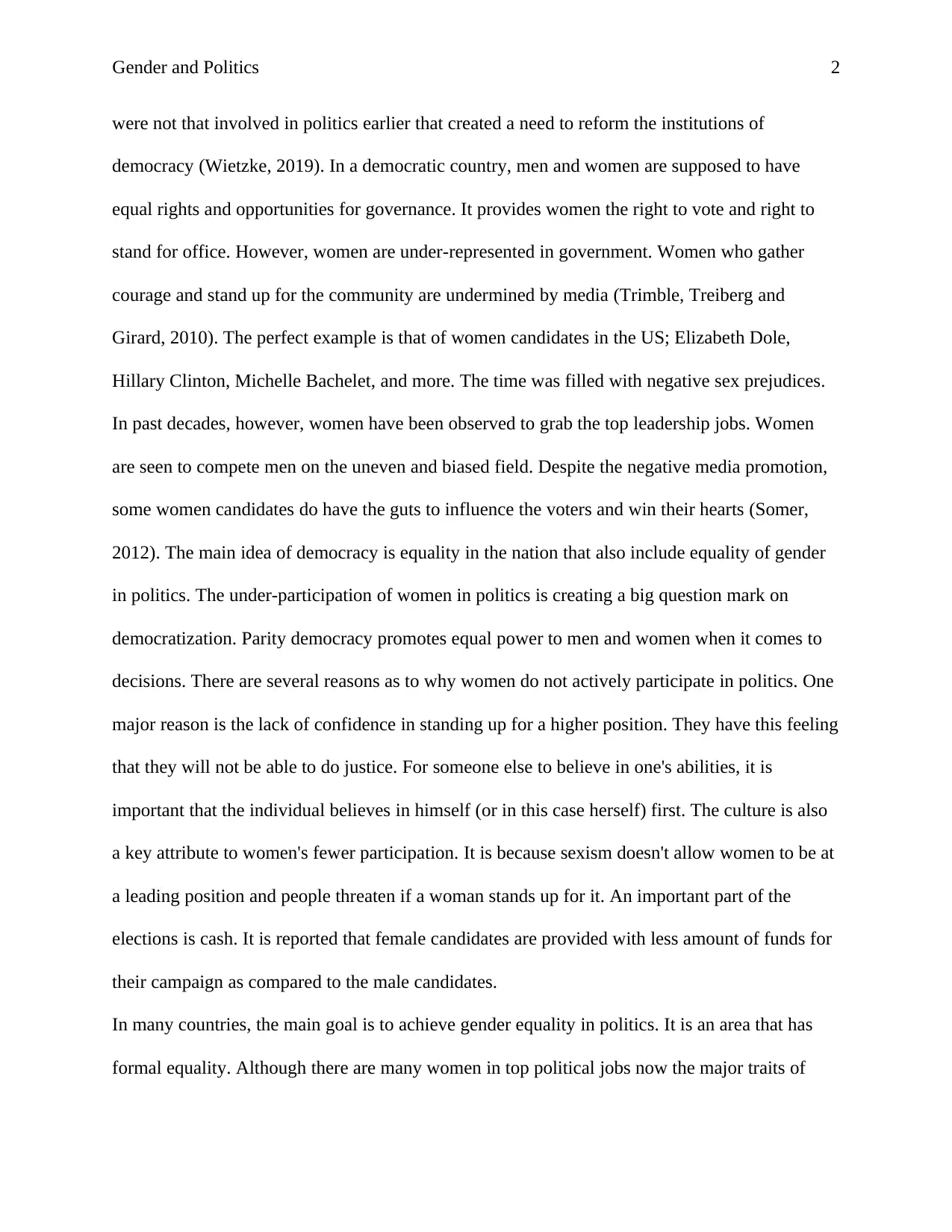
Gender and Politics 2
were not that involved in politics earlier that created a need to reform the institutions of
democracy (Wietzke, 2019). In a democratic country, men and women are supposed to have
equal rights and opportunities for governance. It provides women the right to vote and right to
stand for office. However, women are under-represented in government. Women who gather
courage and stand up for the community are undermined by media (Trimble, Treiberg and
Girard, 2010). The perfect example is that of women candidates in the US; Elizabeth Dole,
Hillary Clinton, Michelle Bachelet, and more. The time was filled with negative sex prejudices.
In past decades, however, women have been observed to grab the top leadership jobs. Women
are seen to compete men on the uneven and biased field. Despite the negative media promotion,
some women candidates do have the guts to influence the voters and win their hearts (Somer,
2012). The main idea of democracy is equality in the nation that also include equality of gender
in politics. The under-participation of women in politics is creating a big question mark on
democratization. Parity democracy promotes equal power to men and women when it comes to
decisions. There are several reasons as to why women do not actively participate in politics. One
major reason is the lack of confidence in standing up for a higher position. They have this feeling
that they will not be able to do justice. For someone else to believe in one's abilities, it is
important that the individual believes in himself (or in this case herself) first. The culture is also
a key attribute to women's fewer participation. It is because sexism doesn't allow women to be at
a leading position and people threaten if a woman stands up for it. An important part of the
elections is cash. It is reported that female candidates are provided with less amount of funds for
their campaign as compared to the male candidates.
In many countries, the main goal is to achieve gender equality in politics. It is an area that has
formal equality. Although there are many women in top political jobs now the major traits of
were not that involved in politics earlier that created a need to reform the institutions of
democracy (Wietzke, 2019). In a democratic country, men and women are supposed to have
equal rights and opportunities for governance. It provides women the right to vote and right to
stand for office. However, women are under-represented in government. Women who gather
courage and stand up for the community are undermined by media (Trimble, Treiberg and
Girard, 2010). The perfect example is that of women candidates in the US; Elizabeth Dole,
Hillary Clinton, Michelle Bachelet, and more. The time was filled with negative sex prejudices.
In past decades, however, women have been observed to grab the top leadership jobs. Women
are seen to compete men on the uneven and biased field. Despite the negative media promotion,
some women candidates do have the guts to influence the voters and win their hearts (Somer,
2012). The main idea of democracy is equality in the nation that also include equality of gender
in politics. The under-participation of women in politics is creating a big question mark on
democratization. Parity democracy promotes equal power to men and women when it comes to
decisions. There are several reasons as to why women do not actively participate in politics. One
major reason is the lack of confidence in standing up for a higher position. They have this feeling
that they will not be able to do justice. For someone else to believe in one's abilities, it is
important that the individual believes in himself (or in this case herself) first. The culture is also
a key attribute to women's fewer participation. It is because sexism doesn't allow women to be at
a leading position and people threaten if a woman stands up for it. An important part of the
elections is cash. It is reported that female candidates are provided with less amount of funds for
their campaign as compared to the male candidates.
In many countries, the main goal is to achieve gender equality in politics. It is an area that has
formal equality. Although there are many women in top political jobs now the major traits of
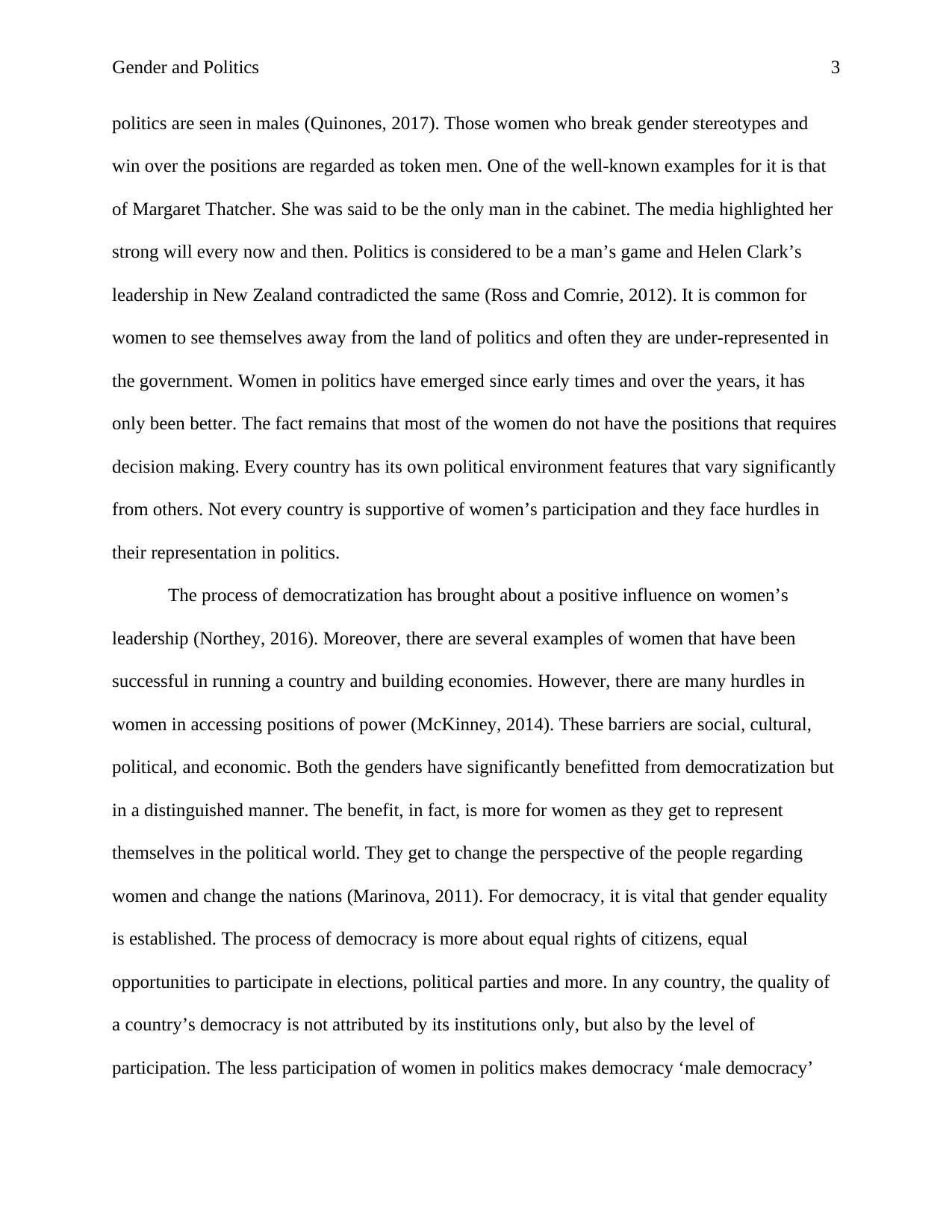
Gender and Politics 3
politics are seen in males (Quinones, 2017). Those women who break gender stereotypes and
win over the positions are regarded as token men. One of the well-known examples for it is that
of Margaret Thatcher. She was said to be the only man in the cabinet. The media highlighted her
strong will every now and then. Politics is considered to be a man’s game and Helen Clark’s
leadership in New Zealand contradicted the same (Ross and Comrie, 2012). It is common for
women to see themselves away from the land of politics and often they are under-represented in
the government. Women in politics have emerged since early times and over the years, it has
only been better. The fact remains that most of the women do not have the positions that requires
decision making. Every country has its own political environment features that vary significantly
from others. Not every country is supportive of women’s participation and they face hurdles in
their representation in politics.
The process of democratization has brought about a positive influence on women’s
leadership (Northey, 2016). Moreover, there are several examples of women that have been
successful in running a country and building economies. However, there are many hurdles in
women in accessing positions of power (McKinney, 2014). These barriers are social, cultural,
political, and economic. Both the genders have significantly benefitted from democratization but
in a distinguished manner. The benefit, in fact, is more for women as they get to represent
themselves in the political world. They get to change the perspective of the people regarding
women and change the nations (Marinova, 2011). For democracy, it is vital that gender equality
is established. The process of democracy is more about equal rights of citizens, equal
opportunities to participate in elections, political parties and more. In any country, the quality of
a country’s democracy is not attributed by its institutions only, but also by the level of
participation. The less participation of women in politics makes democracy ‘male democracy’
politics are seen in males (Quinones, 2017). Those women who break gender stereotypes and
win over the positions are regarded as token men. One of the well-known examples for it is that
of Margaret Thatcher. She was said to be the only man in the cabinet. The media highlighted her
strong will every now and then. Politics is considered to be a man’s game and Helen Clark’s
leadership in New Zealand contradicted the same (Ross and Comrie, 2012). It is common for
women to see themselves away from the land of politics and often they are under-represented in
the government. Women in politics have emerged since early times and over the years, it has
only been better. The fact remains that most of the women do not have the positions that requires
decision making. Every country has its own political environment features that vary significantly
from others. Not every country is supportive of women’s participation and they face hurdles in
their representation in politics.
The process of democratization has brought about a positive influence on women’s
leadership (Northey, 2016). Moreover, there are several examples of women that have been
successful in running a country and building economies. However, there are many hurdles in
women in accessing positions of power (McKinney, 2014). These barriers are social, cultural,
political, and economic. Both the genders have significantly benefitted from democratization but
in a distinguished manner. The benefit, in fact, is more for women as they get to represent
themselves in the political world. They get to change the perspective of the people regarding
women and change the nations (Marinova, 2011). For democracy, it is vital that gender equality
is established. The process of democracy is more about equal rights of citizens, equal
opportunities to participate in elections, political parties and more. In any country, the quality of
a country’s democracy is not attributed by its institutions only, but also by the level of
participation. The less participation of women in politics makes democracy ‘male democracy’
Secure Best Marks with AI Grader
Need help grading? Try our AI Grader for instant feedback on your assignments.
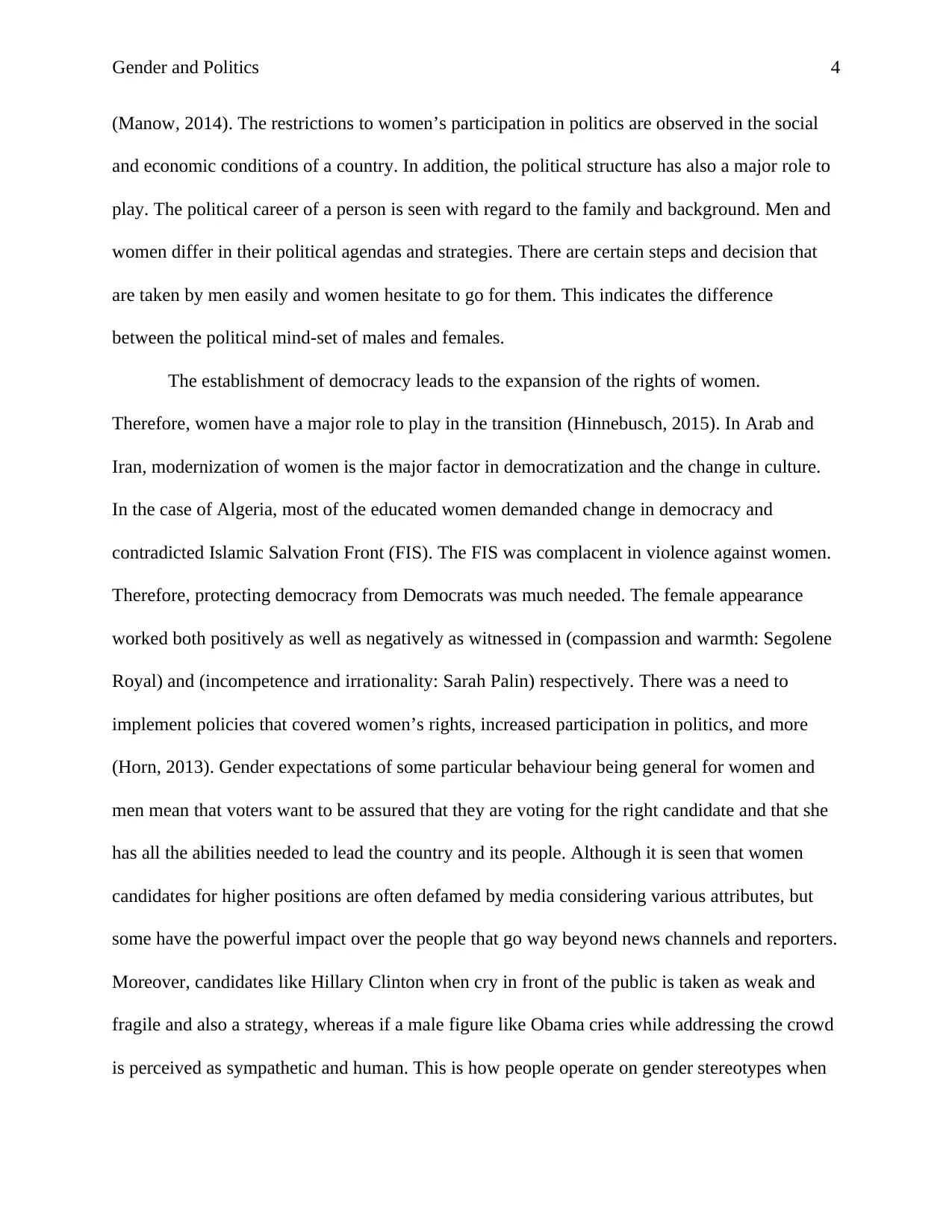
Gender and Politics 4
(Manow, 2014). The restrictions to women’s participation in politics are observed in the social
and economic conditions of a country. In addition, the political structure has also a major role to
play. The political career of a person is seen with regard to the family and background. Men and
women differ in their political agendas and strategies. There are certain steps and decision that
are taken by men easily and women hesitate to go for them. This indicates the difference
between the political mind-set of males and females.
The establishment of democracy leads to the expansion of the rights of women.
Therefore, women have a major role to play in the transition (Hinnebusch, 2015). In Arab and
Iran, modernization of women is the major factor in democratization and the change in culture.
In the case of Algeria, most of the educated women demanded change in democracy and
contradicted Islamic Salvation Front (FIS). The FIS was complacent in violence against women.
Therefore, protecting democracy from Democrats was much needed. The female appearance
worked both positively as well as negatively as witnessed in (compassion and warmth: Segolene
Royal) and (incompetence and irrationality: Sarah Palin) respectively. There was a need to
implement policies that covered women’s rights, increased participation in politics, and more
(Horn, 2013). Gender expectations of some particular behaviour being general for women and
men mean that voters want to be assured that they are voting for the right candidate and that she
has all the abilities needed to lead the country and its people. Although it is seen that women
candidates for higher positions are often defamed by media considering various attributes, but
some have the powerful impact over the people that go way beyond news channels and reporters.
Moreover, candidates like Hillary Clinton when cry in front of the public is taken as weak and
fragile and also a strategy, whereas if a male figure like Obama cries while addressing the crowd
is perceived as sympathetic and human. This is how people operate on gender stereotypes when
(Manow, 2014). The restrictions to women’s participation in politics are observed in the social
and economic conditions of a country. In addition, the political structure has also a major role to
play. The political career of a person is seen with regard to the family and background. Men and
women differ in their political agendas and strategies. There are certain steps and decision that
are taken by men easily and women hesitate to go for them. This indicates the difference
between the political mind-set of males and females.
The establishment of democracy leads to the expansion of the rights of women.
Therefore, women have a major role to play in the transition (Hinnebusch, 2015). In Arab and
Iran, modernization of women is the major factor in democratization and the change in culture.
In the case of Algeria, most of the educated women demanded change in democracy and
contradicted Islamic Salvation Front (FIS). The FIS was complacent in violence against women.
Therefore, protecting democracy from Democrats was much needed. The female appearance
worked both positively as well as negatively as witnessed in (compassion and warmth: Segolene
Royal) and (incompetence and irrationality: Sarah Palin) respectively. There was a need to
implement policies that covered women’s rights, increased participation in politics, and more
(Horn, 2013). Gender expectations of some particular behaviour being general for women and
men mean that voters want to be assured that they are voting for the right candidate and that she
has all the abilities needed to lead the country and its people. Although it is seen that women
candidates for higher positions are often defamed by media considering various attributes, but
some have the powerful impact over the people that go way beyond news channels and reporters.
Moreover, candidates like Hillary Clinton when cry in front of the public is taken as weak and
fragile and also a strategy, whereas if a male figure like Obama cries while addressing the crowd
is perceived as sympathetic and human. This is how people operate on gender stereotypes when
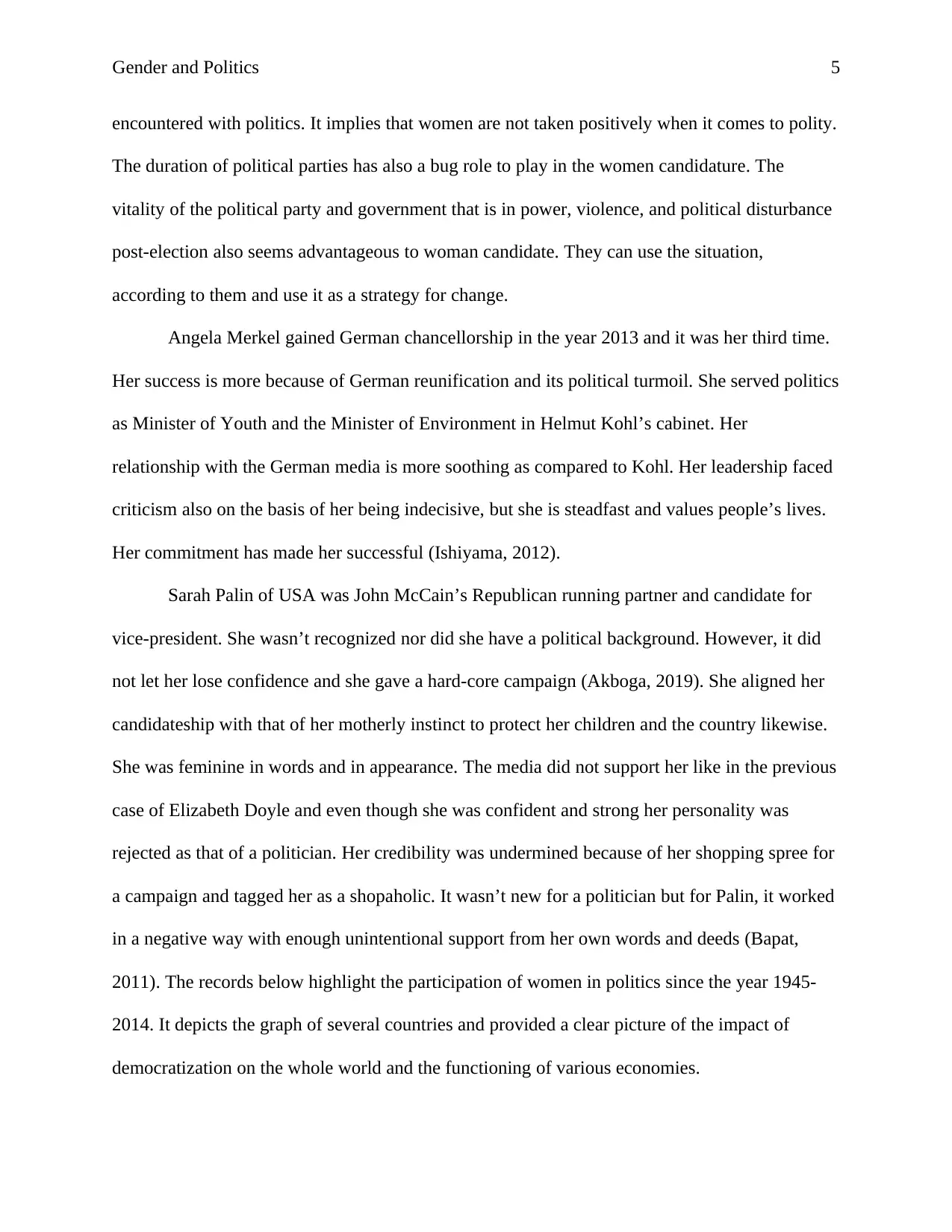
Gender and Politics 5
encountered with politics. It implies that women are not taken positively when it comes to polity.
The duration of political parties has also a bug role to play in the women candidature. The
vitality of the political party and government that is in power, violence, and political disturbance
post-election also seems advantageous to woman candidate. They can use the situation,
according to them and use it as a strategy for change.
Angela Merkel gained German chancellorship in the year 2013 and it was her third time.
Her success is more because of German reunification and its political turmoil. She served politics
as Minister of Youth and the Minister of Environment in Helmut Kohl’s cabinet. Her
relationship with the German media is more soothing as compared to Kohl. Her leadership faced
criticism also on the basis of her being indecisive, but she is steadfast and values people’s lives.
Her commitment has made her successful (Ishiyama, 2012).
Sarah Palin of USA was John McCain’s Republican running partner and candidate for
vice-president. She wasn’t recognized nor did she have a political background. However, it did
not let her lose confidence and she gave a hard-core campaign (Akboga, 2019). She aligned her
candidateship with that of her motherly instinct to protect her children and the country likewise.
She was feminine in words and in appearance. The media did not support her like in the previous
case of Elizabeth Doyle and even though she was confident and strong her personality was
rejected as that of a politician. Her credibility was undermined because of her shopping spree for
a campaign and tagged her as a shopaholic. It wasn’t new for a politician but for Palin, it worked
in a negative way with enough unintentional support from her own words and deeds (Bapat,
2011). The records below highlight the participation of women in politics since the year 1945-
2014. It depicts the graph of several countries and provided a clear picture of the impact of
democratization on the whole world and the functioning of various economies.
encountered with politics. It implies that women are not taken positively when it comes to polity.
The duration of political parties has also a bug role to play in the women candidature. The
vitality of the political party and government that is in power, violence, and political disturbance
post-election also seems advantageous to woman candidate. They can use the situation,
according to them and use it as a strategy for change.
Angela Merkel gained German chancellorship in the year 2013 and it was her third time.
Her success is more because of German reunification and its political turmoil. She served politics
as Minister of Youth and the Minister of Environment in Helmut Kohl’s cabinet. Her
relationship with the German media is more soothing as compared to Kohl. Her leadership faced
criticism also on the basis of her being indecisive, but she is steadfast and values people’s lives.
Her commitment has made her successful (Ishiyama, 2012).
Sarah Palin of USA was John McCain’s Republican running partner and candidate for
vice-president. She wasn’t recognized nor did she have a political background. However, it did
not let her lose confidence and she gave a hard-core campaign (Akboga, 2019). She aligned her
candidateship with that of her motherly instinct to protect her children and the country likewise.
She was feminine in words and in appearance. The media did not support her like in the previous
case of Elizabeth Doyle and even though she was confident and strong her personality was
rejected as that of a politician. Her credibility was undermined because of her shopping spree for
a campaign and tagged her as a shopaholic. It wasn’t new for a politician but for Palin, it worked
in a negative way with enough unintentional support from her own words and deeds (Bapat,
2011). The records below highlight the participation of women in politics since the year 1945-
2014. It depicts the graph of several countries and provided a clear picture of the impact of
democratization on the whole world and the functioning of various economies.
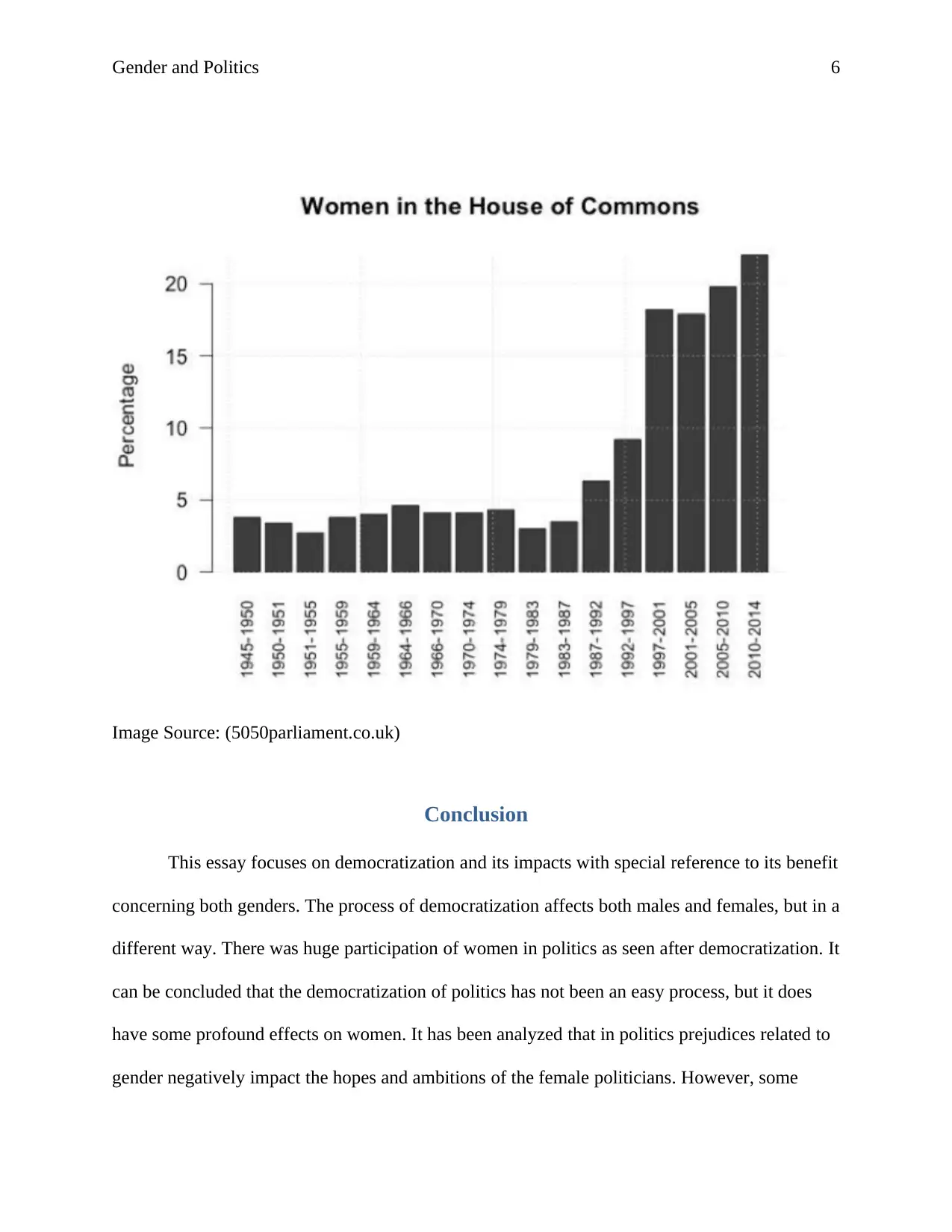
Gender and Politics 6
Image Source: (5050parliament.co.uk)
Conclusion
This essay focuses on democratization and its impacts with special reference to its benefit
concerning both genders. The process of democratization affects both males and females, but in a
different way. There was huge participation of women in politics as seen after democratization. It
can be concluded that the democratization of politics has not been an easy process, but it does
have some profound effects on women. It has been analyzed that in politics prejudices related to
gender negatively impact the hopes and ambitions of the female politicians. However, some
Image Source: (5050parliament.co.uk)
Conclusion
This essay focuses on democratization and its impacts with special reference to its benefit
concerning both genders. The process of democratization affects both males and females, but in a
different way. There was huge participation of women in politics as seen after democratization. It
can be concluded that the democratization of politics has not been an easy process, but it does
have some profound effects on women. It has been analyzed that in politics prejudices related to
gender negatively impact the hopes and ambitions of the female politicians. However, some
Paraphrase This Document
Need a fresh take? Get an instant paraphrase of this document with our AI Paraphraser
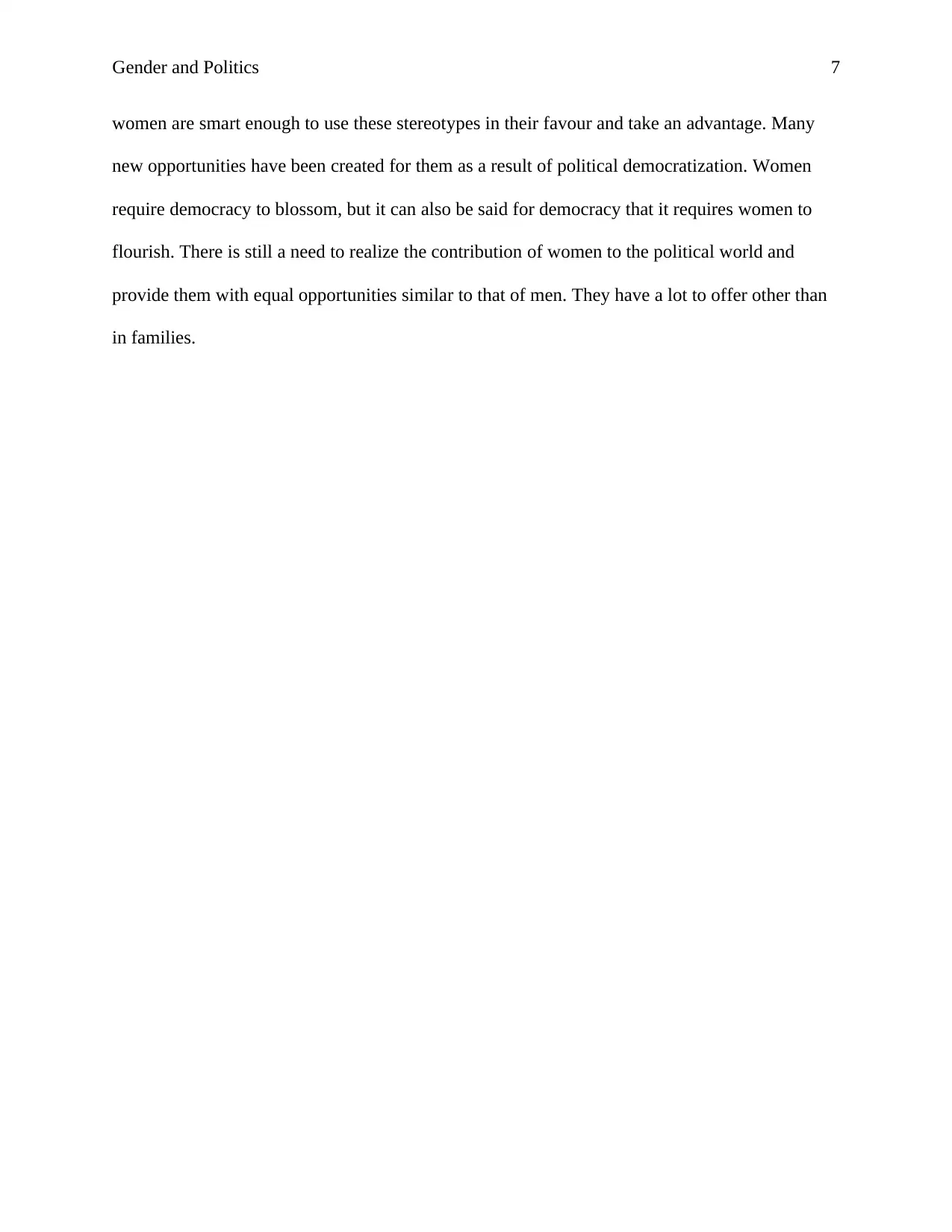
Gender and Politics 7
women are smart enough to use these stereotypes in their favour and take an advantage. Many
new opportunities have been created for them as a result of political democratization. Women
require democracy to blossom, but it can also be said for democracy that it requires women to
flourish. There is still a need to realize the contribution of women to the political world and
provide them with equal opportunities similar to that of men. They have a lot to offer other than
in families.
women are smart enough to use these stereotypes in their favour and take an advantage. Many
new opportunities have been created for them as a result of political democratization. Women
require democracy to blossom, but it can also be said for democracy that it requires women to
flourish. There is still a need to realize the contribution of women to the political world and
provide them with equal opportunities similar to that of men. They have a lot to offer other than
in families.
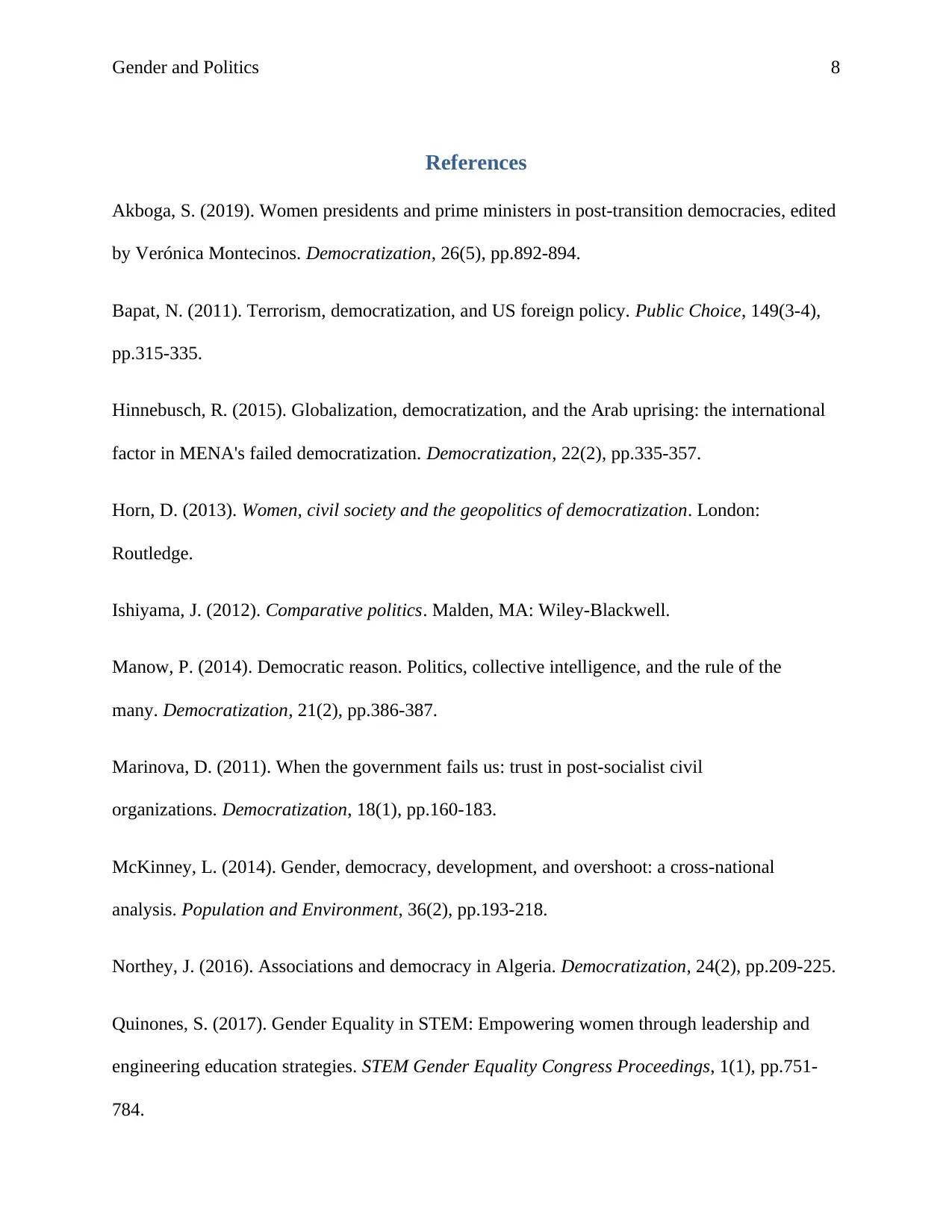
Gender and Politics 8
References
Akboga, S. (2019). Women presidents and prime ministers in post-transition democracies, edited
by Verónica Montecinos. Democratization, 26(5), pp.892-894.
Bapat, N. (2011). Terrorism, democratization, and US foreign policy. Public Choice, 149(3-4),
pp.315-335.
Hinnebusch, R. (2015). Globalization, democratization, and the Arab uprising: the international
factor in MENA's failed democratization. Democratization, 22(2), pp.335-357.
Horn, D. (2013). Women, civil society and the geopolitics of democratization. London:
Routledge.
Ishiyama, J. (2012). Comparative politics. Malden, MA: Wiley-Blackwell.
Manow, P. (2014). Democratic reason. Politics, collective intelligence, and the rule of the
many. Democratization, 21(2), pp.386-387.
Marinova, D. (2011). When the government fails us: trust in post-socialist civil
organizations. Democratization, 18(1), pp.160-183.
McKinney, L. (2014). Gender, democracy, development, and overshoot: a cross-national
analysis. Population and Environment, 36(2), pp.193-218.
Northey, J. (2016). Associations and democracy in Algeria. Democratization, 24(2), pp.209-225.
Quinones, S. (2017). Gender Equality in STEM: Empowering women through leadership and
engineering education strategies. STEM Gender Equality Congress Proceedings, 1(1), pp.751-
784.
References
Akboga, S. (2019). Women presidents and prime ministers in post-transition democracies, edited
by Verónica Montecinos. Democratization, 26(5), pp.892-894.
Bapat, N. (2011). Terrorism, democratization, and US foreign policy. Public Choice, 149(3-4),
pp.315-335.
Hinnebusch, R. (2015). Globalization, democratization, and the Arab uprising: the international
factor in MENA's failed democratization. Democratization, 22(2), pp.335-357.
Horn, D. (2013). Women, civil society and the geopolitics of democratization. London:
Routledge.
Ishiyama, J. (2012). Comparative politics. Malden, MA: Wiley-Blackwell.
Manow, P. (2014). Democratic reason. Politics, collective intelligence, and the rule of the
many. Democratization, 21(2), pp.386-387.
Marinova, D. (2011). When the government fails us: trust in post-socialist civil
organizations. Democratization, 18(1), pp.160-183.
McKinney, L. (2014). Gender, democracy, development, and overshoot: a cross-national
analysis. Population and Environment, 36(2), pp.193-218.
Northey, J. (2016). Associations and democracy in Algeria. Democratization, 24(2), pp.209-225.
Quinones, S. (2017). Gender Equality in STEM: Empowering women through leadership and
engineering education strategies. STEM Gender Equality Congress Proceedings, 1(1), pp.751-
784.
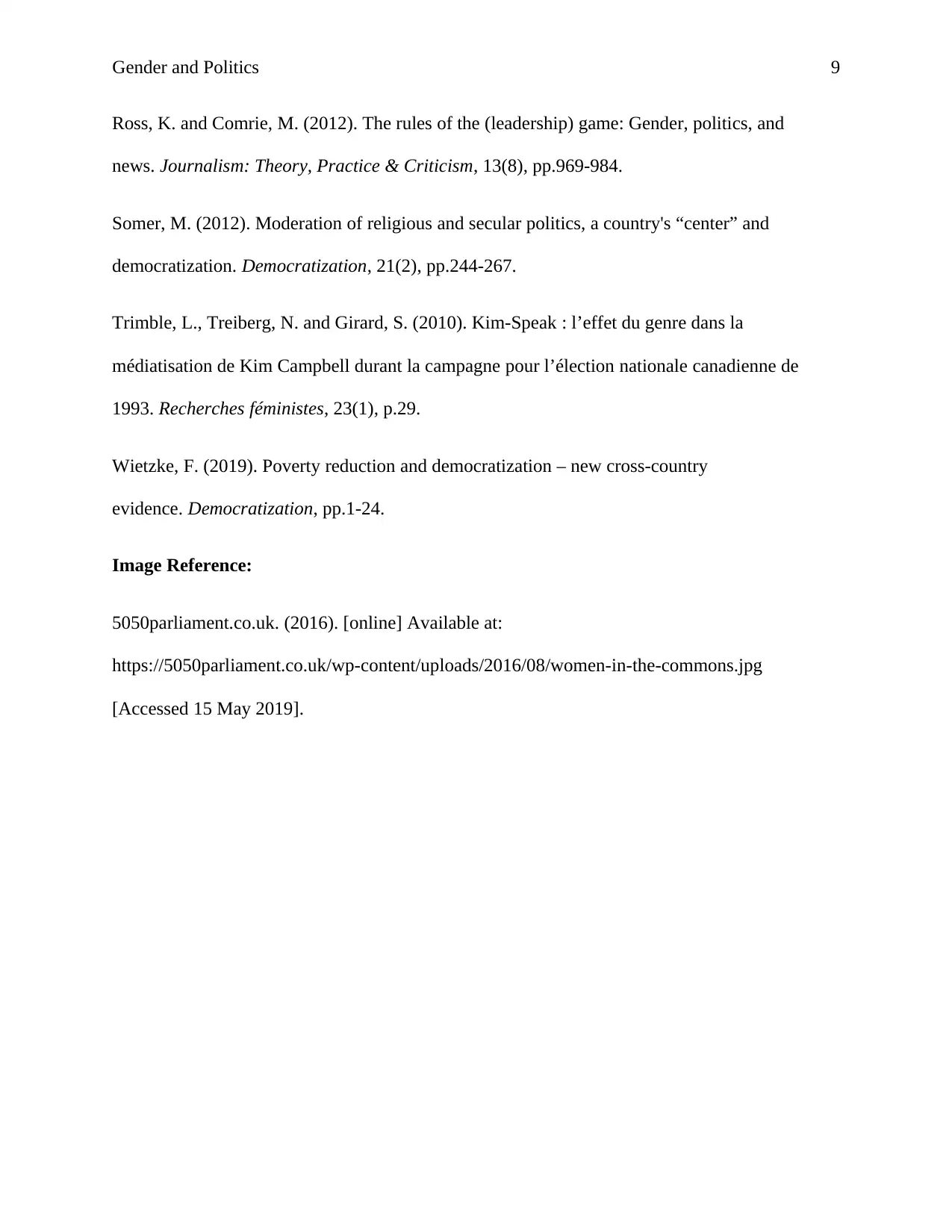
Gender and Politics 9
Ross, K. and Comrie, M. (2012). The rules of the (leadership) game: Gender, politics, and
news. Journalism: Theory, Practice & Criticism, 13(8), pp.969-984.
Somer, M. (2012). Moderation of religious and secular politics, a country's “center” and
democratization. Democratization, 21(2), pp.244-267.
Trimble, L., Treiberg, N. and Girard, S. (2010). Kim-Speak : l’effet du genre dans la
médiatisation de Kim Campbell durant la campagne pour l’élection nationale canadienne de
1993. Recherches féministes, 23(1), p.29.
Wietzke, F. (2019). Poverty reduction and democratization – new cross-country
evidence. Democratization, pp.1-24.
Image Reference:
5050parliament.co.uk. (2016). [online] Available at:
https://5050parliament.co.uk/wp-content/uploads/2016/08/women-in-the-commons.jpg
[Accessed 15 May 2019].
Ross, K. and Comrie, M. (2012). The rules of the (leadership) game: Gender, politics, and
news. Journalism: Theory, Practice & Criticism, 13(8), pp.969-984.
Somer, M. (2012). Moderation of religious and secular politics, a country's “center” and
democratization. Democratization, 21(2), pp.244-267.
Trimble, L., Treiberg, N. and Girard, S. (2010). Kim-Speak : l’effet du genre dans la
médiatisation de Kim Campbell durant la campagne pour l’élection nationale canadienne de
1993. Recherches féministes, 23(1), p.29.
Wietzke, F. (2019). Poverty reduction and democratization – new cross-country
evidence. Democratization, pp.1-24.
Image Reference:
5050parliament.co.uk. (2016). [online] Available at:
https://5050parliament.co.uk/wp-content/uploads/2016/08/women-in-the-commons.jpg
[Accessed 15 May 2019].
1 out of 10
Related Documents
Your All-in-One AI-Powered Toolkit for Academic Success.
+13062052269
info@desklib.com
Available 24*7 on WhatsApp / Email
![[object Object]](/_next/static/media/star-bottom.7253800d.svg)
Unlock your academic potential
© 2024 | Zucol Services PVT LTD | All rights reserved.





